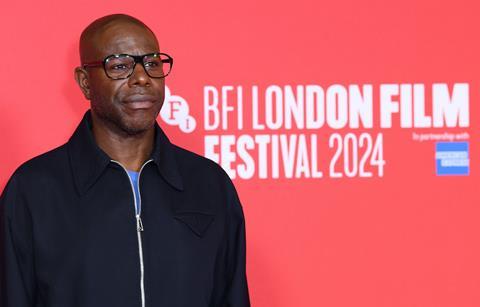
Steve McQueen said he prefers a collaborative style of filmmaking, saying that “being a director is not about being an arsehole”.
“Once you have a situation where everyone’s together – I’ll take a good idea from anybody,” said UK filmmaker McQueen, at a Screen Talk ahead of the world premiere of his new film Blitz, opening the 68th BFI London Film Festival this evening (Wednesday, October 9).
“A director is not about being an arsehole. A director is about listening and feeling and smelling and tasting…There are too many arseholes, trust me,” said the director, who did not name names.
This collaborative approach puts everyone on-set on the same page, which brings better performances from the actors, suggested McQueen. “Actors are highly sensitive individuals, they can feel if something’s up,” said the director. “If they can feel they’re in a space where there is a structure, a support, then they’ll go for it.”
Film sets are also “beautiful places to have conversations” said McQueen – which was an advantage when making his 2018 thriller Widows as the #MeToo movement was building.
“Film sets are beautiful to meet people, have these debates, these conversations,” said the filmmaker, who said he had created a space for Widows where “people are safe to have these conversations, - I’ve created an environment where everyone can have a voice.”
McQueen regularly touched on the topic of trauma, and how it is considered differently today than in his formative years. “As a Black man, I didn’t have the privilege of trauma,” said McQueen, adding that he developed a mentality of “’get the fuck on with it, and deal with it later’.”
“My way of dealing with a certain kind of trauma was to do stuff,” he said. “Maybe I love working too much.”
Silent history
Blitz follows a nine-year-old boy determined to reunite with his mother and grandfather after being sent away to the countryside. Newcomer Elliott Heffernan leads the cast, alongside Saoirse Ronan, Screen Star of Tomorrow Harris Dickinson, Paul Weller, Kathy Burke, Stephen Graham and Benjamin Clementine.
The director says the film is inspired by “a silent history that was around us”, that he was initially unaware of when growing up in London, until his mother took him to various markets around the city when he would carry her shopping. “I got an idea of London I never would’ve got without being the donkey carrying the bags for [my] mother,” said McQueen.
The film will have a limited theatrical release in the UK and Ireland on November 1, expanding on November 8 and prior to streaming on Apple TV+.
The session touched on all of McQueen’s feature films, from 2008’s Hunger through 2014 best picture Oscar winner 12 Years A Slave, and five-film anthology Small Axe from 2020.
“I know for a fact that if Obama wasn’t president, 12 Years A Slave would not have been made,” said McQueen. “This was before #OscarsSoWhite, before loads of things were being spoken about. After that, a lot of Black filmmakers got an opportunity to make their movie. I’m proud of that.
“Also, the conversation about slavery was reignited – I’m grateful for that.” The director also acknowledged the lack of Oscar nominations for Black creatives in the years immediately after 12 Years A Slave’s success. “It is what it is,” said McQueen. “I don’t know how to add to that.”
Asked if Widows had received enough Hollywood support, McQueen revealed he had wanted the poster to feature just its four female leads; but was overruled in favour of a poster with all the major cast on it, including men.
“Sometimes it’s timing,” said the director. “If I made that movie now, it’d be a different thing and the people behind the machine would do something different. I think we were ahead of the curve on that one.”
To complete silence in the BFI’s NFT1 room, the director also told a chilling story from his late father who, when picking fruit in Florida in the 1950s, went for a drink at night with two Jamaican colleagues.
“As they walked into the bar, the barman said, ‘We don’t serve niggers.’ So one of the Jamaican guys said ‘OK - we’ll serve ourselves’, took a bottle and smashed it over the barman’s head,” said McQueen. The trio “ran and ran and ran”, before hiding in a field; where McQueen’s father heard two gunshots; and never saw the two Jamaican men again. “I have to carry that shit with me – I might not be alive,” said the director.

























No comments yet